Nuclear risks have been growing steadily in recent years. This is a paradox of the 21st
century, given that Russia and the United States have, with some success, spent years trying to reduce their nuclear arsenals, managing to establish a dialogue between their nuclear scientists. Despite the complicated bilateral relations, there was a certain system and a culture of dialogue about the nuclear sphere. At some point the status quo has changed dramatically, apparently not only as a result of a worsening political situation, but also due to a newly emerging attitude towards nuclear weapons in general.
Strategic nuclear weapons are perceived as something abstract and incapable of causing real harm, because they will never be used, at least not intentionally. On the other hand, the psychological barrier for using tactical nuclear weapons appears to be much lower today.
The risks stem not only, or even primarily, from quantitative indicators, but also from the broken system of nuclear arms control, the lack of transparency and trust between states and their leaders, and the lack of dialogue in the sphere of nuclear security at all levels.
The perception of the scale of the danger posed by nuclear weapons differs substantially among the younger generation and the generation that witnessed the Cold War, Hiroshima, Nagasaki and the Cuban missile crisis. The Cold War generation is gradually ceding ground to those who were born during its final years or after it ended. There is a potential risk that the next generation of leaders will pay less attention to the issues of nuclear arms control, not to mention the newer generation of millennials, who have an even more abstract idea of what nuclear weapons actually mean. This is one of many reasons why it is so important to avoid a complete collapse of the nuclear arms control regime or a rupture of relations in the nuclear sphere that will be impossible to repair in the future. It is also why we need to raise public awareness of the nuclear arms problem and the threat it portends.
Nuclear risks have been growing steadily in recent years. This is a paradox of the 21st
century, given that Russia and the United States have, with some success, spent years trying to reduce their nuclear arsenals, managing to establish a dialogue between their nuclear scientists. Despite the complicated bilateral relations, there was a certain system and a culture of dialogue about the nuclear sphere. At some point the status quo has changed dramatically, apparently not only as a result of a worsening political situation, but also due to a newly emerging attitude towards nuclear weapons in general.
Strategic nuclear weapons are perceived as something abstract and incapable of causing real harm, because they will never be used, at least not intentionally. On the other hand, the psychological barrier for using tactical nuclear weapons appears to be much lower today.
The risks stem not only, or even primarily, from quantitative indicators, but also from the broken system of nuclear arms control, the lack of transparency and trust between states and their leaders, and the lack of dialogue in the sphere of nuclear security at all levels.
The perception of the scale of the danger posed by nuclear weapons differs substantially among the younger generation and the generation that witnessed the Cold War, Hiroshima, Nagasaki and the Cuban missile crisis. The Cold War generation is gradually ceding ground to those who were born during its final years or after it ended. There is a potential risk that the next generation of leaders will pay less attention to the issues of nuclear arms control, not to mention the newer generation of millennials, who have an even more abstract idea of what nuclear weapons actually mean. This is one of many reasons why it is so important to avoid a complete collapse of the nuclear arms control regime or a rupture of relations in the nuclear sphere that will be impossible to repair in the future. It is also why we need to raise public awareness of the nuclear arms problem and the threat it portends.
Former United States Secretary of Energy (2013 to 2017) and current Co-Chairman and Chief Executive Officer of the Nuclear Threat Initiative (NTI) Ernest Moniz recently paid a visit to Moscow, attracting attention from the expert community and a number of government agencies. In particular, the Russian International Affairs Council held a Seminar entitled “Russia – U.S. Relations in the Nuclear Sphere: Pathways to Cooperation.”
Given the limited dialogue between Russia and the United States, the withdrawal of the United States from the Joint Comprehensive Plan of Action (JCPOA) and the ambiguous situation on the Korean Peninsula, such contacts and discussions have taken on particular importance and significance. While Ernest Moniz is not a government official and does not represent the U.S. administration, he is head the of a large organization (NTI) that calls for a world free of nuclear weapons, at the very least for the prevention of the use and the mitigation of risks of using nuclear weapons. Ernest Moniz subscribes to the view that Russia and the United States are the key players in the nuclear sphere and, as such, they need to cooperate on a permanent basis to reduce nuclear risks.
It makes sense to separate nuclear security issues from the broader security agenda, since those issues go beyond bilateral relations. All Euro-Atlantic nations share an interest in preserving the U.S.–Russian Intermediate-Range Nuclear Forces Treaty. What is more, the countries in the region are also interested in the full implementation of the New START and its extension until 2026. Now is clearly not the best time to discuss these matters, but the lack of dialogue on them is producing an even greater uncertainty.
The expert community in the Euro-Atlantic region has stressed that undermining the JCPOA has exacerbated the nuclear threat in the region and weakened the ability to counter the threat of using nuclear weapons globally. The implications of the United States’ withdrawal from the Iran deal are hard to predict fully so far. Russian diplomats have pointed out that the withdrawal is sending the wrong signal to North Korea. A reasonable question would be whether it is possible to convince North Korea to accept an agreement, as the example of Iran shows that the decision may be reversed at any time.
Cooperation between Russian and U.S. scientists might create a basis for restoring trust between the two nations. Ernest Moniz said that he was trying to convince all interested parties both in Washington and in Moscow that the United States and Russia should return to mutually beneficial scientific cooperation in order to mitigate nuclear risks.
Many in Russia are also in favour of renewing the practice of scientific diplomacy. Scientific diplomacy is an element of soft power, which becomes particularly important during times of crisis in bilateral relations. Scientific diplomacy was widely used in U.S.–Russia relations during the Cold War years. This type of cooperation is possible and crucial in the current crisis too. Relations between scientists are among the few remaining links in international relations. Scientists have traditionally enjoyed quite a high level of public trust, while classic and military diplomacy has been gradually losing public confidence, as society has yet to see quick results or a weakening of the crisis in relations between Russia and the West. According to the President of the Russian Academy of Sciences, Alexander Sergeyev, “this happens because people with a scientific worldview are more resilient to ideology and a have better understanding of the scale of challenges and threats.”
Whenever governments find it difficult to maintain relations at the official level, back channels are employed to maintain a dialogue, such as NGOs and think tanks or contacts between research institutions and individual scientists. Under the current circumstances, it is important to make use of niches where cooperation is possible and to try and restore the spirit of pragmatic cooperation to prevent the freezing of relations and to pass the experience gained and results achieved to the next generation.






